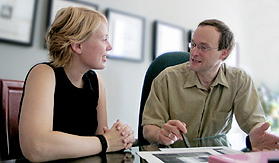Marianna was visibly confused. “There must be some trick to hiring the right person,” she protested. “I have a friend at another company who uses this test with a circle graph. It tells them who they should hire.”
“And, how is that working for them?” I asked.
She chuckled. “Truth be told, they don’t do any better than we do here.”
“So, are you going to use the circle graph test?” I wanted to know.
Marianna smiled and shook her head. “You keep saying that hiring the right people is just plain hard work, that there is no trick.”
“Lot’s of people want to get better at hiring. There are tons of books about the subject. You can go to seminars, hire consultants. Why do you think so few are successful at selecting the right people?” I asked.
“I sit across the interview table, candidate on the other side. It’s like there is a vast unknown about this person. And, as the hiring manager, I have a lot at risk. If the candidate doesn’t work out, I have damage control and then I have to start over, interviewing again.”
“Marianna, there are no tricks to beating the odds. You just have to know what the odds are, and the odds are against you. You cannot casually approach the hiring process. It requires preparation. Solid thought has to go into designing the role. Most hiring managers don’t know what they need in the role, so it’s no wonder they don’t know what to look for in the candidate.”
Marianna’s eyes closed for a moment. She was thinking. Her eyes opened, “First, I have to design the role?”
“Only, then, will you know what to look for. And it’s not on the circle graph.”
______________
Orientation for our online program Hiring Talent opened Monday. You can still get in on the fun. Register here – Hiring Talent.
